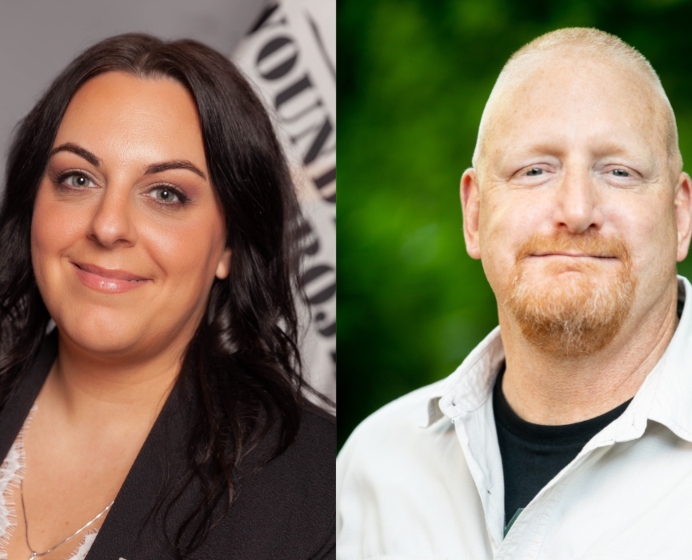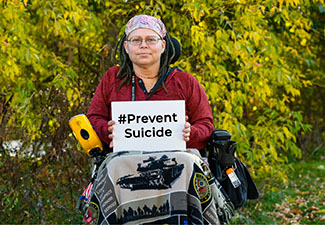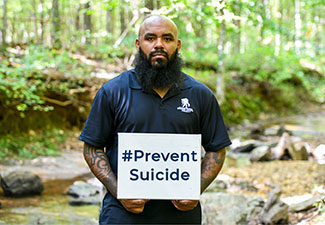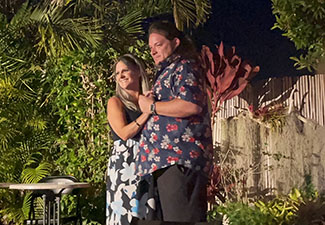Preventing Suicide is Possible: Wounded Warrior Project Provides Training to Save Lives

Suicide is preventable. There are steps individuals and communities can take to be a part of the solution in preventing suicide, including training on how to recognize warning signs and provide lifesaving interventions.
Suicide prevention training equips individuals and communities with the skills needed to recognize and respond to someone who may be showing signs of suicidal ideation.
This type of training can also hold profound importance in the veteran community. According to the Department of Veterans Affairs (VA), the suicide rate for veterans is 72% higher than for non-veterans. VA also reports that an average of 17 veterans die by suicide each day, underscoring the need for targeted interventions.
Preventing veteran suicide is a priority for Wounded Warrior Project® (WWP), which provides free life-changing programs for veterans and their families. As part of its suicide prevention efforts, WWP conducts training across the country to give communities the tools to talk openly about suicide.
“Wounded Warrior Project is prioritizing training for our teammates and partners,” said Lindsey Gray, senior suicide prevention training specialist for WWP. “By increasing the number of individuals trained to recognize warning signs and provide effective, evidence-based prevention, intervention, and postvention support, WWP is working to ensure that veterans at risk of suicide have more opportunities to interact with individuals who are informed about suicide risk.
What is WWP’s Suicide Prevention Training?
Applied Suicide Intervention Skills Training (ASIST), created by Living Works, is a two-day workshop facilitated by WWP. The workshops help participants learn how to talk to someone about suicide, the signs to watch for, and how to develop a plan to support their immediate safety.
The training emphasizes the importance of creating a safe environment where open conversations can occur, and individuals feel supported and understood.
“It’s important for people to be confident and competent when engaging in discussions about suicide,” said Lindsey. “We want them to feel equipped to connect people with the appropriate care and support.”
One of ASIST’s key strengths is its practical, hands-on approach. Participants learn how to develop a “safety plan” with someone at risk, connecting them to resources and support networks that can provide ongoing assistance. This approach is particularly effective for veterans, who often benefit from structured, actionable strategies that offer clear steps and support.
Why Training is so Important
Suicide is complex, and there is no single reason or cause for someone to attempt or think about suicide. Data from WWP’s most recent Warrior Survey* found that among post-9/11 warriors, post-traumatic stress disorder (PTSD), military sexual trauma (MST), and substance use correlated with higher self-reported thoughts of suicide.
Within the veteran community, the number of suicides and suicidal ideation is also increasing for women veterans and younger veterans and warriors.
WWP's 2023 Women Warrior Report shows rates of suicidal ideation and attempted suicide are higher among WWP women warriors than male warriors. Women warriors are also more likely to experience barriers to care than male warriors. According to VA’s most recent annual report on suicide, from 2020 to 2021, the age-adjusted suicide rate increased more than 6% among veteran men and 24% among veteran women. Furthermore, the age-adjusted suicide rate of veteran women was 166% higher than that of non-veteran U.S. adult women.
Suicide is currently the second leading cause of death for Gen Z Americans, ages 10–24, according to the Centers for Disease Control. Close to 40% of young warriors, ages 18-24, surveyed* by WWP had suicidal thoughts in the past year.
For WWP, improving mental health and reducing suicides is a priority not only for warriors but also for their caregivers and families.
Between Oct. 1, 2022, and Sept. 30, 2023, mental health was the top program referral among family support members and caregivers.
WWP funded the Family Resource Hub in collaboration with the Elizabeth Dole Foundation to eliminate barriers for family support members and caregivers when seeking care.
With specialized suicide prevention training, more people in veteran communities can become advocates for suicide prevention, offering life-saving support.
“I didn’t talk about it because I thought it was taboo,” said Army veteran and woman warrior Angie Lupe, who also dealt with thoughts of suicide at points in her life. “What I thought was a weakness has turned into a strength that I can turn around and help empower other veterans to keep going. We can’t keep losing each other. We survived the battlefield, and we’re here for a reason. We can’t lose sight of that.”
Working with Corporate Partners

Bryan Tucker of CSX talks to attendees at WWP's Corporate Partners Summit. WWP has worked with CSX and other corporate partners to provide suicide prevention training and create safer veteran communities.
WWP’s corporate partners share the mission of honoring and empowering wounded warriors, and many have a large number of veteran employees. WWP’s suicide prevention training helps corporate partners become better equipped to support those employees and the veterans in their communities.
"We know that it is more important than ever to provide suicide prevention training, help remove stigmas around mental health, and promote social and emotional well-being overall,” said Bryan Tucker, vice president of Stakeholder Engagement and Sustainability at CSX. “Based on our work to date with Wounded Warrior Project through Pride in Service, we also understand that those in the military and first responder communities are at an even greater risk than the rest of the population for certain challenges associated with mental health. We are incredibly grateful to Wounded Warrior Project for the lifesaving work they do every day and for offering CSX such impactful opportunities to tap into best-in-class tools and resources.”
Working with Community Partners
WWP recognizes that no organization can meet all the needs of the veteran community alone. Through its community partnerships program, WWP unites and empowers a community of support for wounded veterans, families, and caregivers.

Wounded Warrior Project works closely with the Travis Manion Foundation to support veteran families.
As the largest nonprofit funder of veterans service organizations, WWP’s partnerships create a network of support, fill gaps in its programs, and reinforce existing efforts. To amplify its efforts to prevent suicide, WWP provides suicide prevention training to some of its community partners.
“The mental health and well-being of our nation’s veterans and preventing veteran suicide are the most important issues we face in this community,” said Travis Manion Foundation chief operating officer Josh Jabin. “Travis Manion Foundation programming provides a preventative approach to the factors that contribute to veteran suicide, and through our partnership with Wounded Warrior Project, the ongoing support and training we receive on suicide prevention is invaluable in helping our team provide a continuum of care of our nation’s most valuable asset, our veterans.”
Expanding Our Reach to Save Lives

Wounded Warrior Project conducts suicide prevention training across the country for companies, communities, other service organizations, and more.
WWP is determined to reduce the number of veteran suicides.
The organization doesn’t just work with corporate and community partners on these efforts. When it comes to suicide prevention, WWP has testified before Congress, participated in the VA/DoD Suicide Prevention Conference, and shared prevention strategies at the American Association of Suicidology (AAS) Conference. WWP has also provided suicide prevention training to other veterans service organizations, first responders, and veteran-heavy companies like defense contractor Lockheed Martin.
“Wounded Warrior Project presented a session on suicide prevention to our military veteran community that was supportive and informative. The flexibility of the presenters to facilitate a Q&A throughout allowed attendees to add to their “toolkit” of resources if one ever encounters someone in crisis,” Lockheed Martin wrote in an email. “The authenticity and care in their delivery of this topic created a sense of urgency in the audience to be diligent in our awareness of someone’s ‘cry for help.’”
Getting Involved
Suicide prevention training like that provided by WWP plays a vital role in equipping individuals with the skills needed to intervene effectively and compassionately.
Expanding access to such training can empower communities to support those at risk and save lives. The fight against suicide requires a collective effort. With the right tools and training, we can make a significant difference.
“Suicide is complex, with no single cause, and no one approach can stop it,” Lindsey said. “But prevention is possible, and we believe everyone has a role to play.”
If you, or someone you know, need support, you can call, text, or chat with the National Suicide Prevention Lifeline at 988, or contact the Crisis Text Line by texting "TALK" to 741741.
Find out more about how WWP helps prevent suicide.
*Warrior Survey, Wave 2 (conducted June 15-Aug. 24, 2022)
Contact: Paris Moulden, Public Relations, pmoulden@woundedwarriorproject.org, 904.570.7910
About Wounded Warrior Project
Since 2003, Wounded Warrior Project® (WWP) has been meeting the growing needs of warriors, their families, and caregivers — helping them achieve their highest ambition. Learn more about Wounded Warrior Project.



